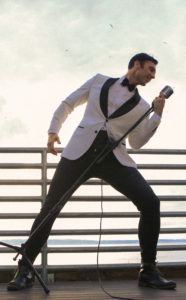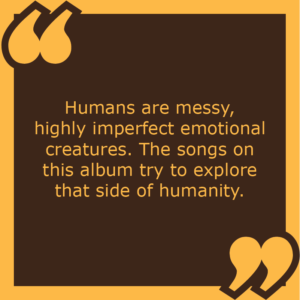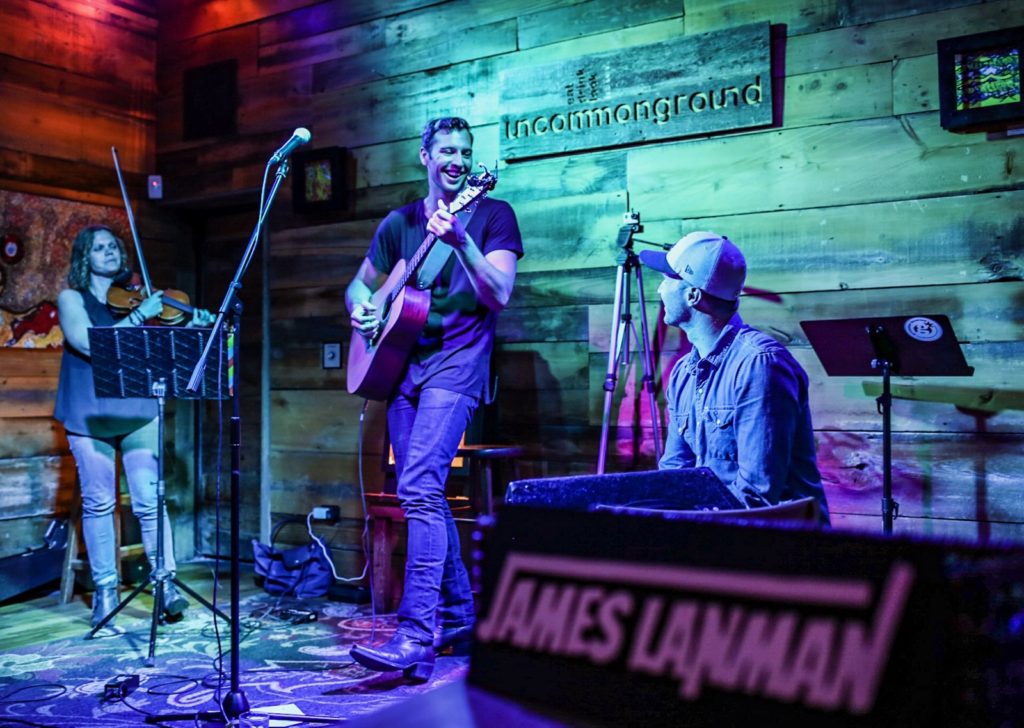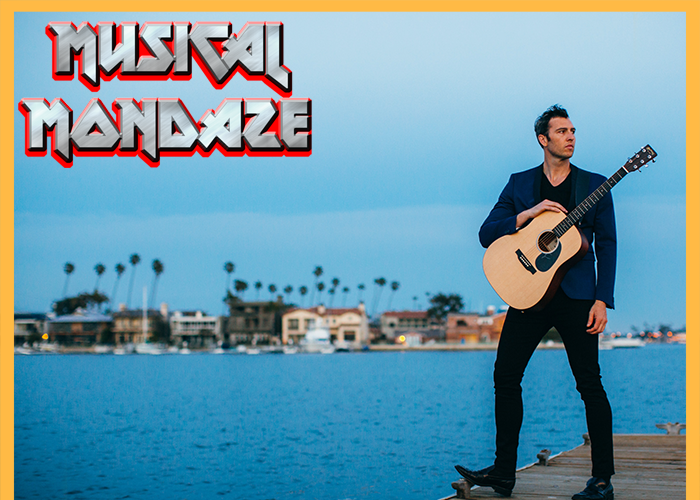 After performing more than 120 living room shows across the United States and Canada in 2017, James Lanman discovered something about music: if a song isn’t good enough to stand on its own acoustically and completely stripped down, then it doesn’t deserve the high-priced studio treatment. That revelation lead him to create his latest album, “Mosaics,” a beautifully-intimate collection of songs that the California-based singer-songwriter crafted to be an interactive experience for listeners. Releasing one new track each Friday until the album as a whole is revealed, the latest single, “I Lost Myself” is available now.
After performing more than 120 living room shows across the United States and Canada in 2017, James Lanman discovered something about music: if a song isn’t good enough to stand on its own acoustically and completely stripped down, then it doesn’t deserve the high-priced studio treatment. That revelation lead him to create his latest album, “Mosaics,” a beautifully-intimate collection of songs that the California-based singer-songwriter crafted to be an interactive experience for listeners. Releasing one new track each Friday until the album as a whole is revealed, the latest single, “I Lost Myself” is available now.
We recently sat down with Lanman to discuss the imperfections of humanity, the magic of solo performances, and the moment he realized he was living out his dream.
TrunkSpace: You’re releasing your new album, “Mosaics,” one song at a time. Did that factor into how you set up the order of the tracks on the record? Why was it so important that “Still a Liar” hold the first position?
Lanman: I really wanted this album to be interactive and to see how listeners interpreted the songs and get a feel for what the larger story of the album means to them before leading them to any conclusions. For me, the excitement of how people interpret meaning is the best part. For this reason, the release order isn’t necessarily the track order I would have laid out. I wanted this body of work to be an ongoing dialogue on the themes this album deals with and I wanted to start with “Still a Liar” because it really sets the tone for the album.
The song is meant to read as a drunk dial resulting in a long rambling voicemail. I wanted to juxtapose the stark honesty of a profound admission (“And when the day is done / Honey I’m still a liar”) against the simple motivation to call someone just because you miss them (“But I just called you to say / That I was thinking about you today”). To me, the idea of someone spilling their guts to a lifeless machine in an attempt to win someone back while being so self aware of why it will never work is strangely poetic. Humans are messy, highly imperfect emotional creatures. The songs on this album try to explore that side of humanity.
I joke that “Still a Liar” is one of the most honest songs on the album despite it being about admitting that I’m a liar. As a songwriter, the idea that two things can be true and at odds at the same time is what makes storytelling interesting. I think this song prefaces that this is an album that thrives on the paradox. It’s an album of open-ended questions and in the case of “Still a Liar” it asks whether people can change?
TrunkSpace: Part of why you’re releasing the album in this fashion is to build a longer lasting impression – a personal connection – with each song. In a way, it feels a bit like the early days of commercial music when artists like Buddy Holly nurtured singles as opposed to full albums. Is there a reason why you still felt this collection of songs belonged on an album and not as individual singles?
nurtured singles as opposed to full albums. Is there a reason why you still felt this collection of songs belonged on an album and not as individual singles?
Lanman: Yes, this album tells the story of how I really found my voice as a writer, as a musician and as a human being. It’s an entire era of pivotal moments in my life that shaped who I am at present. As singles, they each hold their own lesson or revelation that are individually significant, but they were all born of a certain age. This is why I named the album, “Mosaics.” They are individual pieces from a life that form a bigger picture of who I am.
It’s also a way for me to put a bow on a collection of songs I’ve carried with me for a long time. Some of these were written this year but a couple were written six or seven years ago. It felt right to let these songs go one at a time but to house them under the same roof. For a long time I had this feeling that these songs were ‘unfinished business’ and I couldn’t move on until there was closure. Putting these out as a collection makes me feel like I now have permission to move past that part of my life and onto the next chapter creatively.
TrunkSpace: The album feels very intimate. It doesn’t feel like we’re listening, but instead, that we’re listening in – seated a few feet away from you while you perform the songs. Was this a conscious decision on your part… to try and bring the listener into the experience as opposed to being on the outside looking (or listening) in?
Lanman: I’m glad it feels that way. That was my intention. Touring alone as a solo artist these past three years has really taught me so much about how people perceive my music. I spent years trying to create a sound worthy of people’s ears and almost went broke trying to throw money at studios and producers to figure that out. But what I ended up realizing by touring and how people received my live album is that if a song isn’t strong enough to stand on its own acoustically and completely stripped down – then it has no business being dressed up with bells and whistles. I was going about it backwards.
I self produced this album by taking time off from touring, enrolling in a local community college to take audio production classes so I had access to their studio and recorded everything with a really spartan setup with zero budget. These songs have nothing to hide behind. They are raw, the production is straightforward and they are the way you would hear me if I was playing for you and your friends in your living room. Living room concerts taught me how powerful an experience it can be for listeners to hear you like that, up close and personal. I’ve actually found that on larger stages, you lose a lot of that magic when you perform acoustically because so much hinges on the ephemeral nature of hearing a song so close and only for that moment in time.

TrunkSpace: What are you most proud of with the album?
Lanman: I’m most proud that I finished it. I tried recording some of these songs on the road and kept getting 60 percent of the way there and scrapping it entirely because I didn’t like the sound. There was so much internal struggle that went into finishing this that people will never see overcoming lack of resources, lack of quiet spaces to record on the road, self doubt, etc. It’s so easy to start projects but it’s so much more difficult to really finish something, especially a large project. I think some of that blood, sweat and tears can be felt in the music but for me, that’s definitely what I am most proud of, getting it done and releasing it to the world.
TrunkSpace: Where are you hardest on yourself as an artist?
Lanman: Is that a trick question? (Laughter) Probably in feeling that what I’m doing is never good enough. I used to show a buddy of mine my demos and he would be like, “Put that out, it’s so good.” and I would say, “No, this is just a demo. It’s super unpolished.” Then never put it out because it was never going to be that unattainably perfect version I dreamt up in my head. I recently joked with him that “Mosaics” is the ‘demo’ album he always wanted me to put out. I definitely obsess over the details way too much. I’m still learning to let that go.
TrunkSpace: You’ve written and performed in a band atmosphere as well as in a solo capacity. How do the two experiences differ and do they both spark a different part of your brain creatively?
Lanman: After touring solo for three years the thing that’s become so apparent about that difference is the vulnerability of it all. When I perform alone, all eyes are on me and the sound is so minimal that every misstep feels a hundred times more apparent. They are hanging on every word, every note – people can actually hear the lyrics! It’s a double edged sword because for all of the uncomfortableness it can breed, there is also a ton of magic in the spontaneity of it.
Creatively, it has forced me to look much closer at everything from the way I sing, to the dynamics of songs to the lyrics. I think about how songs will be live when I write them now. There’s also a great more deal of improvisation now that there wasn’t before. To really get people engaged you have to tear down the fourth wall that a lot of performers put up to try and look cool. Because there’s no looking cool when you’ve driven for hours after sleeping at a Walmart the night before and you roll out of your van with nothing but a crazy dream three feet away from their prying eyes. They can see everything and there’s no fooling anyone from the safety of a large stage where you’re blending into four bandmates, fog machines and laser beams.
At that point, there’s nothing left but to appeal to the shared experience of being human and laugh about it. From the moment I open my mouth in front of a new audience I’m looking for that common ground that connects us. It’s crucial to establish that honest connection so when I’m performing, listeners feel connected to the music. You have to give them permission and freedom to experience it fully. I think above all else, performing solo has forced me to open up with people in a way that I didn’t in a band.

TrunkSpace: What are the perfect conditions for you to tap into your creative space? Where are you at your best with new ideas?
Lanman: People never believe me when I tell them I’m an introvert, especially when they hear I did 120 performances in 2017 ranging from 10 person audiences in small apartments to performing for thousands in the Fargodome. But the perfect conditions for writing are when I can completely disappear from the world and get engrossed in my own thoughts without distraction. I actually “write” a lot of ideas when I’m driving late at night when there’s no one else on the road and I can just sing out lyric or melodic ideas into the darkness. My dream environment if I ever get this lucky would be to own a ranch somewhere like Wyoming with a studio where I could disappear to every winter and write for large stretches of time between stints on the road.
The biggest thing I’ve noticed about my creative process is that it usually happens when I have the freedom to experiment and burn up time. If there’s a deadline looming or other obligations, I find it really difficult to do meaningful work.
TrunkSpace: What would 10-year-old James think about the music that his future self is currently writing? Would he be surprised by where your musical path has taken you?
Lanman: Definitely! 10-year-old James didn’t even know music was an option. I didn’t pick up a guitar and even start singing until I was an adult so I think 10-year-old me would be amazed to see that this is where I ended up and probably a bit horrified by some of the quirks living this way presents. He would be like, “Are we going to be homeless? We look pretty happy but we live in a van?” (Laughter)
TrunkSpace: What has been the highlight of your career thus far?
Lanman: Having the realization that I didn’t have to be performing in arenas in order for me to be able to live the dream of being a full time musician. The moment I quit compromising the life I wanted and sold everything to live into a van and pursue music full time is a moment I’ll mark as one of the great treasures of my lifetime.
TrunkSpace: Time machine question. If you could jump ahead 10 years and get a glimpse of what your career looks like a decade from now, would you take that journey? If not, why?
Lanman: That’s a scary question! I think I would because I believe our fates aren’t set in stone and I would take the opportunity to get the hindsight we always wish we had. Taking the leap I did and re-approaching what it means to be a ‘successful musician’ for myself meant putting more emphasis on realities instead of fantasies. I really believe that if you put in the work consistently, you’ll go farther than you could have ever imagined. If things didn’t go as planned in the future I would want to know why, so I could do something different.
But on the other hand, if you told me the future was unchangeable then I wouldn’t want to see it. The biggest lesson I’ve kept close to heart since starting this journey is to do away with expectations. Accept the losses and savor the victories but let myself enjoy the journey as it comes. As cheesy as it sounds, life really is all about the ride. If I can’t change the future then at least I have control over the present and what I choose to do with it moment to moment. For me, that freedom will always outweigh the setbacks.
The latest track from “Mosaics” drops today here!


